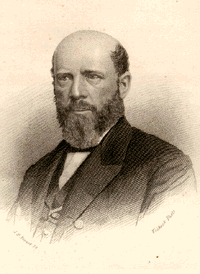Biographical Sketch of Robert Graham
Text from Moore, W. T. (editor), Living Pulpit of the Christian
Church. Cincinnati: R. W. Carroll & Co., Publishers, 1871.
Pages 207-208. This online edition © 1995, James L. McMillan.
 Born: Liverpool, England, August 14, 1822.
Born: Liverpool, England, August 14, 1822.
Died: January 20, 1901.
THIS distinguished preacher and teacher was born in Liverpool, England, on the 14th of August,
1822. The parents were rigid Episcopalians, and the son was, consequently, brought up in the
communion of the Established Church. When only fourteen years of age, during a protracted
meeting among the Methodist Protestants of Alleghany City, Penn., he was deeply impressed with
the importance of religion, and was led to doubt the correctness of the position he occupied in the
Episcopal Church. Although failing to experience the miraculous change, which at that time was a
popular evidence of conversion, he was, nevertheless, received on probation, and finally into full
membership in the Methodist Protestant Church. He was now conscious of a great change in his
views, feelings, and conduct, but he was still unsatisfied with reference to his religious state.
There were many passages of Scripture he could not harmonize with the teachings of the Church
to which he belonged.
In the fall of 1838 he made the acquaintance of the congregation of Disciples in Alleghany
City, Penn., and was thus brought to review the grounds of his religious belief. This examination
led to his immersion, on the 17th of February, 1839, by Elder SAMUEL CHURCH, then pastor
of the Christian Church in Alleghany City.
At the time he united with the Disciples he was an apprentice for five years, " learning the
art and mystery of house-carpentry," in the city of Pittsburgh, and, of course, had very little time
to devote to literary pursuits. Nevertheless, he collected quite a library of useful and entertaining
books, and devoted all his spare hours to the acquisition of knowledge; and having joined a
literary society, made considerable progress in the study of history, Belles-Lettres, Biblical
Criticism, Natural Science, etc.
On the 1st of January, 1843, he entered Bethany College, and, in the following year, began
to preach for the church at Dutch Fork, seven miles from Bethany, and continued to labor there
on Lord's days for three years. By the sale of his library, carpenters' tools, the small salary
received for preaching, and occasional help from President CAMPBELL, he was enabled to
support himself at college. He subsequently returned all the means Mr. CAMPBELL advanced,
with interest on the same from date. While a student at Bethany, he was married to Miss MARIA
THORNLEY, of Alleghany City, Penn.
He graduated in July, 1847, dividing the first honors of his class with A. R. BENTON, and
delivering the Latin salutatory. In December of the same year he entered upon a collecting tour
for Mr. CAMPBELL, and spent nine months in traveling through several of the South-western
States. It was during this tour that he co-operated with JOHN T. JOHNSON, in a protracted
meeting of great interest, at Fayetteville, Arkansas, which resulted in the establishment of a fine
church in that place, to the pastoral care of which he was soon afterward called. He removed to
Fayetteville with his family in January, 1849. Here he finally succeeded in establishing Arkansas
College, an institution which flourished till the war broke out, in 1861.
In September, 1859, he left Arkansas for Harrodsburg, Kentucky, to take charge of the
Chair of Belles-Lettres and History in Kentucky University, to which he had been unanimously
elected. He held this position one year, during which time he gave great satisfaction to the friends
of the University. He was induced to resign his professorship in 1860, and return to Fayetteville,
with the view of becoming the General Agent of the Southern Christian Missionary Society. But
the war breaking out, the whole arrangement failed, and, in the fall of 1862, he took charge of the
First Church in Cincinnati, Ohio, where he labored with great acceptance till 1864, when he
resigned and removed to Santa Rosa, California, and preached for the church, and taught an
academy at that place, one year. He then spent one year in San Francisco, and succeeded in
establishing a promising church in that city. In January, 1866, he was elected Presiding Officer of
the College of Arts, and Professor of the School of English Language and Literature, in Kentucky
University. He accepted, and entered upon his work in the following October, which position he
now occupies.
ROBERT GRAHAM has a finely-balanced organization--there being perfect harmony
between the intellectual and physical natures. He is of low stature, but heavy-set, and weighs
about one hundred and eighty pounds. He has a bright, florid complexion, large, light-blue eyes,
and an orator's mouth. He is a ready extemporaneous speaker, and, on a great occasion, is capable
of exercising wonderful power over an audience. He possesses a strong, active, sympathetic
nature, and this gives him great influence in the social circle. Few men have more ability to control
the masses, but this is never attempted at a sacrifice of dignity, or any characteristic of a Christian
gentleman.
Back to Robert Graham Page |
Back to W. T. Moore Page
Back to Biographies at the Restoration Movement Pages
Back to Main Restoration Movement Page